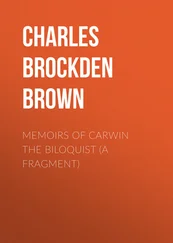Charles Brown - Ormond; Or, The Secret Witness. Volume 3 (of 3)
Здесь есть возможность читать онлайн «Charles Brown - Ormond; Or, The Secret Witness. Volume 3 (of 3)» — ознакомительный отрывок электронной книги совершенно бесплатно, а после прочтения отрывка купить полную версию. В некоторых случаях можно слушать аудио, скачать через торрент в формате fb2 и присутствует краткое содержание. Жанр: foreign_antique, foreign_prose, на английском языке. Описание произведения, (предисловие) а так же отзывы посетителей доступны на портале библиотеки ЛибКат.
- Название:Ormond; Or, The Secret Witness. Volume 3 (of 3)
- Автор:
- Жанр:
- Год:неизвестен
- ISBN:нет данных
- Рейтинг книги:4 / 5. Голосов: 1
-
Избранное:Добавить в избранное
- Отзывы:
-
Ваша оценка:
- 80
- 1
- 2
- 3
- 4
- 5
Ormond; Or, The Secret Witness. Volume 3 (of 3): краткое содержание, описание и аннотация
Предлагаем к чтению аннотацию, описание, краткое содержание или предисловие (зависит от того, что написал сам автор книги «Ormond; Or, The Secret Witness. Volume 3 (of 3)»). Если вы не нашли необходимую информацию о книге — напишите в комментариях, мы постараемся отыскать её.
Ormond; Or, The Secret Witness. Volume 3 (of 3) — читать онлайн ознакомительный отрывок
Ниже представлен текст книги, разбитый по страницам. Система сохранения места последней прочитанной страницы, позволяет с удобством читать онлайн бесплатно книгу «Ormond; Or, The Secret Witness. Volume 3 (of 3)», без необходимости каждый раз заново искать на чём Вы остановились. Поставьте закладку, и сможете в любой момент перейти на страницу, на которой закончили чтение.
Интервал:
Закладка:
"What!" said the startled Constantia; "have you fought in the ranks?"
"Certainly. Hundreds of my sex have done the same. Some were impelled by the enthusiasm of love, and some by a mere passion for war; some by the contagion of example; and some – with whom I myself must be ranked – by a generous devotion to liberty. Brunswick and Saxe-Coburg had to contend with whole regiments of women, – regiments they would have formed, if they had been collected into separate bodies.
"I will tell thee a secret. Thou wouldst never have seen Martinette de Beauvais, if Brunswick had deferred one day longer his orders for retreating into Germany."
"How so?"
"She would have died by her own hand."
"What could lead to such an outrage?"
"The love of liberty."
"I cannot comprehend how that love should prompt you to suicide."
"I will tell thee. The plan was formed, and could not miscarry. A woman was to play the part of a banished Royalist, was to repair to the Prussian camp, and to gain admission to the general. This would have easily been granted to a female and an ex-noble. There she was to assassinate the enemy of her country, and to attest her magnanimity by slaughtering herself. I was weak enough to regret the ignominious retreat of the Prussians, because it precluded the necessity of such a sacrifice."
This was related with accents and looks that sufficiently attested its truth. Constantia shuddered, and drew back, to contemplate more deliberately the features of her guest. Hitherto she had read in them nothing that bespoke the desperate courage of a martyr and the deep designing of an assassin. The image which her mind had reflected from the deportment of this woman was changed. The likeness which she had, feigned to herself was no longer seen. She felt that antipathy was preparing to displace love. These sentiments, however, she concealed, and suffered the conversation to proceed.
Their discourse now turned upon the exploits of several women who mingled in the tumults of the capital and in the armies on the frontiers. Instances were mentioned of ferocity in some, and magnanimity in others, which almost surpassed belief. Constantia listened greedily, though not with approbation, and acquired, at every sentence, new desire to be acquainted with the personal history of Martinette. On mentioning this wish, her friend said that she endeavoured to amuse her exile by composing her own memoirs, and that, on her next visit, she would bring with her the volume, which she would suffer Constantia to read.
A separation of a week elapsed. She felt some impatience for the renewal of their intercourse, and for the perusal of the volume that had been mentioned. One evening Sarah Baxter, whom Constantia had placed in her own occasional service, entered the room with marks of great joy and surprise, and informed her that she at length had discovered Miss Monrose. From her abrupt and prolix account, it appeared that Sarah had overtaken Miss Monrose in the street, and, guided by her own curiosity, as well as by the wish to gratify her mistress, she had followed the stranger. To her utter astonishment, the lady had paused at Mr. Dudley's door, with a seeming resolution to enter it, but presently resumed her way. Instead of pursuing her steps farther, Sarah had stopped to communicate this intelligence to Constantia. Having delivered her news, she hastened away, but, returning, in a moment, with a countenance of new surprise, she informed her mistress that on leaving the house she had met Miss Monrose at the door, on the point of entering. She added that the stranger had inquired for Constantia, and was now waiting below.
Constantia took no time to reflect upon an incident so unexpected and so strange, but proceeded forthwith to the parlour. Martinette only was there. It did not instantly occur to her that this lady and Mademoiselle Monrose might possibly be the same. The inquiries she made speedily removed her doubts, and it now appeared that the woman about whose destiny she had formed so many conjectures and fostered so much anxiety was no other than the daughter of Roselli.
Having readily answered her questions, Martinette inquired, in her turn, into the motives of her friend's curiosity. These were explained by a succinct account of the transactions to which the deceased Baxter had been a witness. Constantia concluded with mentioning her own reflections on the tale, and intimating her wish to be informed how Martinette had extricated herself from a situation so calamitous.
"Is there any room for wonder on that head?" replied the guest. "It was absurd to stay longer in the house. Having finished the interment of Roselli, (soldier-fashion,) for he was the man who suffered his foolish regrets to destroy him, I forsook the house. Roselli was by no means poor, but he could not consent to live at ease, or to live at all, while his country endured such horrible oppressions, and when so many of his friends had perished. I complied with his humour, because it could not be changed, and I revered him too much to desert him."
"But whither," said Constantia, "could you seek shelter at a time like that? The city was desolate, and a wandering female could scarcely be received under any roof. All inhabited houses were closed at that hour, and the fear of infection would have shut them against you if they had not been already so."
"Hast thou forgotten that there were at that time at least ten thousand French in this city, fugitives from Marat and from St. Domingo? That they lived in utter fearlessness of the reigning disease, – sung and loitered in the public walks, and prattled at their doors, with all their customary unconcern? Supposest thou that there were none among these who would receive a countrywoman, even if her name had not been Martinette de Beauvais? Thy fancy has depicted strange things; but believe me that, without a farthing and without a name, I should not have incurred the slightest inconvenience. The death of Roselli I foresaw, because it was gradual in its approach, and was sought by him as a good. My grief, therefore, was exhausted before it came, and I rejoiced at his death, because it was the close of all his sorrows. The rueful pictures of my distress and weakness which were given by Baxter existed only in his own fancy."
Martinette pleaded an engagement, and took her leave, professing to have come merely to leave with her the promised manuscript. This interview, though short, was productive of many reflections on the deceitfulness of appearances, and on the variety of maxims by which the conduct of human beings is regulated. She was accustomed to impart all her thoughts and relate every new incident to her father. With this view she now hied to his apartment. This hour it was her custom, when disengaged, always to spend with him.
She found Mr. Dudley busy in revolving a scheme which various circumstances had suggested and gradually conducted to maturity. No period of his life had been equally delightful with that portion of his youth which he had spent in Italy. The climate, the language, the manners of the people, and the sources of intellectual gratification in painting and music, were congenial to his taste. He had reluctantly forsaken these enchanting seats, at the summons of his father, but, on his return to his native country, had encountered nothing but ignominy and pain. Poverty and blindness had beset his path, and it seemed as if it were impossible to fly too far from the scene of his disasters. His misfortunes could not be concealed from others, and every thing around him seemed to renew the memory of all that he had suffered. All the events of his youth served to entice him to Italy, while all the incidents of his subsequent life concurred to render disgustful his present abode.
His daughter's happiness was not to be forgotten. This he imagined would be eminently promoted by the scheme. It would open to her new avenues to knowledge. It would snatch her from the odious pursuit of Ormond, and, by a variety of objects and adventures, efface from her mind any impression which his dangerous artifices might have made upon it.
Читать дальшеИнтервал:
Закладка:
Похожие книги на «Ormond; Or, The Secret Witness. Volume 3 (of 3)»
Представляем Вашему вниманию похожие книги на «Ormond; Or, The Secret Witness. Volume 3 (of 3)» списком для выбора. Мы отобрали схожую по названию и смыслу литературу в надежде предоставить читателям больше вариантов отыскать новые, интересные, ещё непрочитанные произведения.
Обсуждение, отзывы о книге «Ormond; Or, The Secret Witness. Volume 3 (of 3)» и просто собственные мнения читателей. Оставьте ваши комментарии, напишите, что Вы думаете о произведении, его смысле или главных героях. Укажите что конкретно понравилось, а что нет, и почему Вы так считаете.












